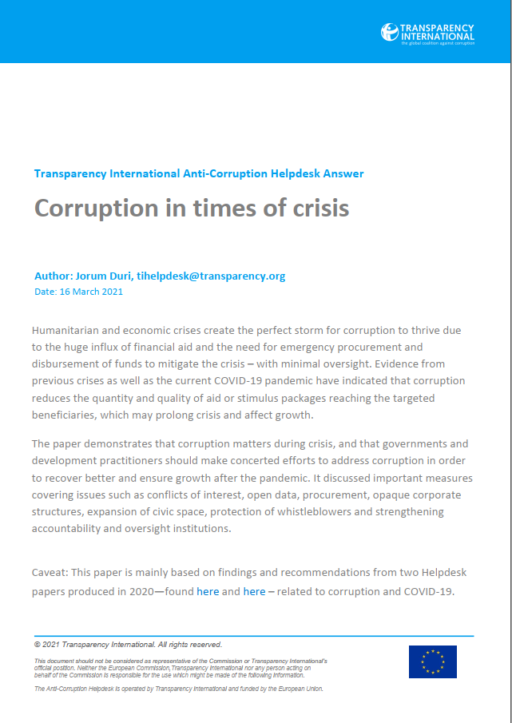
This Anti-Corruption Helpdesk brief was produced in response to a query from one of Transparency International’s national chapters. The Anti-Corruption Helpdesk is operated by Transparency International and funded by the European Union.
Query
Please review previous materials related to corruption in times of crisis, and extract findings and recommendations relevant to donors and leading economies, as well as anything pertinent to the international coordination of anti-corruption efforts more broadly
Summary
Humanitarian and economic crises create the perfect storm for corruption to thrive due to the huge influx of financial aid and the need for emergency procurement and disbursement of funds to mitigate crises – with minimal oversight. Evidence from previous crises as well as the current COVID-19 pandemic have indicated that corruption reduces the quantity and quality of aid or stimulus packages reaching the targeted beneficiaries, which may prolong the crisis and affect growth.
The paper demonstrates that corruption matters during crisis, and that governments and development practitioners should make concerted efforts to address corruption in order to recover better and ensure growth after the pandemic. It discussed important measures covering issues such as conflicts of interest, open data, procurement, opaque corporate structures, expansion of civic space, protection of whistleblowers and strengthening accountability and oversight institutions.
Contents
- Corruption risks during crisis
- Measures to mitigate corruption during crisis
- Conclusion
- References
Main points
- Since the beginning of the COVID pandemic, there has been a huge influx of financial resources which are prone to corruption. For instance, The IMF announced US$1 trillion landing capacity for its member countries to curtail the impact of COVID-19.
- According to the 2020 Corruption Perception Index analysis, countries with higher levels of corruption spend less on health. Much-needed investments in health care are diverted from public coffers, leaving societies without medical staff, equipment, medicines and, in some cases, clinics and hospitals There are increased calls for countries to recover for the pandemic with integrity. For instance, the message from the United Nations Secretary General during the 2020 International Anti-Corruption Day highlighted the importance of anti-corruption in the recovery from the pandemic
Authors
Jorum Duri, [email protected]
Date
29/03/2021

